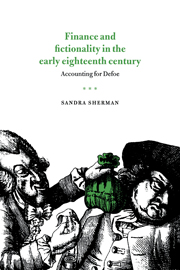2 - Defoe and fictionality
Published online by Cambridge University Press: 12 January 2010
Summary
TELLING IT LIKE IT ISN'T: DEFOE'S IDEOLOGICAL FICTIONS AND THE SUBVERSION OF THE PUBLIC SPHERE
The preceding chapter argued that credit-based texts were untraceable to a provenance. Obligations charged to a particular Fund did not necessarily represent dedicated capital, but might float on ledgers like afterimages. An impersonal market allocated “credit” to a stock, its holder, or issuer. Discredit at one site redounded to another. The credit-based market was a web of obligations, and no indicia isolated nodes in the web. No agent dissolved the palimpsest of text and opinion that obscured originary, “intrinsick” value. Responsibility for texts in the market was perpetually deferred.
This chapter argues in its first section that strategies deployed by Defoe's political fictions are homologous with credit-based tropes. By “political fictions” I mean fictional narratives that are ideologically freighted and intended to persuade. The distinguishing quality of Defoe's political fictions is that as with stocks, Funds, and credit instruments, they elicit epistemological confusion by disrupting attempts to determine their veracity. The author can neither be found nor held to account (without extratextual data), since the text is occupied by an ostensible “author.” While the reader may have a different perspective from such an “author,” and may doubt his reliability, no hors-texte suggests an hermeneutic that might indicate the text's provenance. The reader, limited by the text, interprets it as if the “author” wrote it.
Defoe produced dozens of such texts. Among them, The Secret History of the October Club (1711), “By a Member.” A Letter from A Member of the House of Commons (1713).
- Type
- Chapter
- Information
- Finance and Fictionality in the Early Eighteenth CenturyAccounting for Defoe, pp. 55 - 90Publisher: Cambridge University PressPrint publication year: 1996

